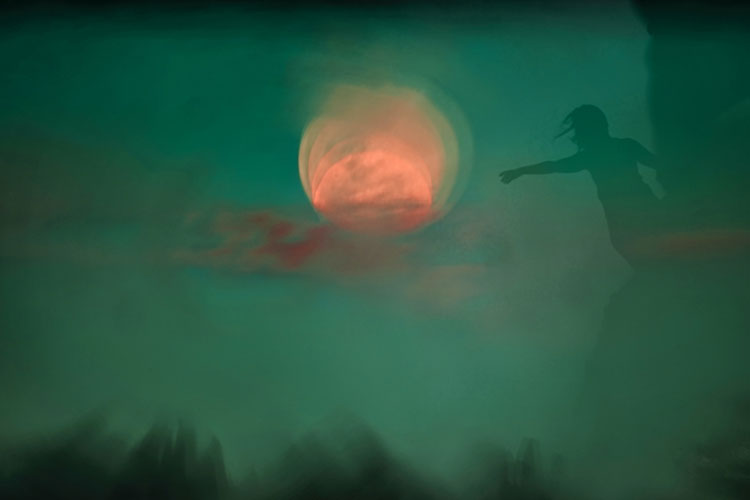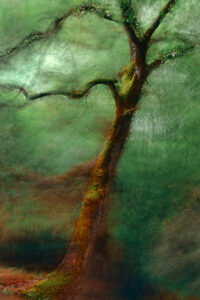Because of my unexpected dive into the poetic ocean of Vuong this morning, which I wrote about separately from what follows here (Read “A Revelation: Ocean Vuong”), my curiosity carried me into the jaws of Google, where rabbit holes tangled and infinite can pull me in like black holes that prey on my addiction to know things. Details, the trivial. Things.
And once there, I slid over to Ocean Vuong’s account on Instagram, where he has a sizable following though he does not post often. He happened to have posted only a few weeks ago, however, in response to the death of Charles Simic, the Serbian-American Pultizer-winning poet who had been a professor of Vuong’s.
In that post, Vuong shared a photo of a framed email exchange he had with Simic in 2014. In that email, Simic wrote this to Vuong: “I never had a better group of poems at the end of the semester from a student in my forty-five years of teaching. You are an incredibly original, moving and beautiful poet, and I bow to you, Sir.”
In the caption of the Instagram post, Vuong wrote:
I have always felt that to be a writer is to study at the desk of “no”. The rejections, denials, refusals, the humiliation of working, sometimes for years, without an iota that anything will “come of it”, that you’ll have anything to prove to loved ones who wait baffled on the wings for you to get “a real job,” “to be happy,” these nos become prerequisites of the few “yeses” who appear, when they finally do, like lush patches of cool grass to rest on the long and unpromised journey. Charlie was one of those people who gave me my first patch of grass, for which I am forever indebted. He was a generous, sharp, and witty mind who dedicated his whole life, having already lost his home and kin to war, to being a poet. He made it feel, at times, like it was the only thing worth doing. And maybe it takes a naive, foolish, and sanguine young writer to truly believe this, but I’m glad I did. But this was made possible by attempting to meet the expectations his generous praise afforded.
It’s possible the belief, the true, naive belief, in studying “at the desk of ‘no’” is something much more easily bought into by the young and, for the relative few who get this far, the eventually successful. Vuong was/is both.

He is a unique talent who, from afar, it seems was assured success in some way, in the way that rare and charismatic talents can seem destined to be. Though, I’m certain he did not feel that way as an even younger man whose heart seems so poured into fluid connection with poetic expression as life, as being. There are no guarantees, of course.
Nonetheless, his rise to prominence as a poet, essayist and novelist came in his 20s. For the significant majority of us, no such success seems destined, to ourselves or onlookers.
America has a myth of being a land of opportunity, and to some relative extent that might be true, it’s just we rarely know anyone who has actually achieved renowned heights, let alone know how to reach them ourselves.
Yet, now in fairness to Vuong’s “study at the desk of ‘no’,” his post reminds me that I have been responsible for my “failings” as much as any lack of talent or yeses, surely.
In my late 20s, at an age similar to Vuong’s when his first full collection of poetry was published, “Night Sky With Exit Wounds,” I was the recipient of the O.O. McIntyre Writing Fellowship.
It was for my book proposal, for which I would buy, drive and live with and in my 1975 VW bus Boio for a summer in the interior of the United States: Flyover Land.
After three months and nearly 12,000 miles and 20-something states of adventure, I returned to the home I shared with my now-wife, Becca. And soon enough, we headed off to northern India for a couple months for her to work on a photography project in a prison there.
During the day, after we’d had breakfast together in the fish bowl of the hotel’s ground-floor restaurant, where we stood out as amusing anomalies to passers-by on their way to school, to work, to wherever their daily morning rushes carried them, Becca would say goodbye and go with the young tuk-tuk driver we hired, Gautum, and I would order one more cup of Nespresso before returning to our room to write.
In that hotel room, where monkeys lined the ledge outside our window a few stories above the chaos of the streets below, I’d write. And write and write. I had a dream, an ambition. I was going to be someone, be a real writer, and have a published book.

When we returned back to St. Louis, where we lived, I’d start sending my outline and early chapters and book proposal to book publishers and agents. One by one, the “nos” dripped in. I collected around forty to forty-five of them.
At first they didn’t hurt so badly. They were expected; “everyone knows rejection is part of this business.” Then they began to feel overwhelming, daggers in the heart. I was failing and, I suppose, came to recognize failure as the desperate default. Eventually, I declared my book idea obviously tired and unworthy. I gave up.
I boxed the notes, the highlighted maps, the research materials I’d collected. I boxed the files of the chapters I’d written and the outlines I’d drafted. I boxed the rejections. I put the box in a closet. Away. Hidden nearly 20 years ago but not forgotten. Unforgettable. The failure that has moved with us to three more houses over the years and still lurks in whatever closet is nearby my desk.
I can hardly read the scribbled notes these days, or at least the last time we moved and I encountered them. The laptop I used for writing while on the road that summer, and in the hotel room in India that winter, has since given out. It’s been replaced by at least three or four generations of newer laptops since, including, of course, the one I’m writing these very words on now.
Along the way, back when I was still trying to get a publisher, my grandmother, who has since gone but must have been nearly 90 years of age at the time, called out across the room from her seat at a family gathering, across the family members moving and talking here and there, to check-in about the state of my book publishing success. Thankfully, I was already lying down on the couch.
She asked if I had found a publisher.
“No.” … That clearly wasn’t the answer she’d hoped for. “I have several chapters written, though. I’d share them with you, if you want to read them.”
I wouldn’t have offered that to anyone else, given the unfinished condition of it all being in mid-process. But I didn’t know what might happen when, or not. And at her age …
“Would you like to read those?”
“No.” With immediacy. And a head turn. Discussion over.
I know my sweet, tough and gentle grandmother meant no harm. But at that moment, what I felt was not just a publisher’s form-letter rejection of the product I was pitching. I felt my grandmother’s rejection of my writing, of my experience, of my … everything related to it.
It was the hardest no. Lying on the couch, I was glad I didn’t have to look anyone in the eye after that semi-public dismissal.
I no longer remember where that exchange fit in the timeline of my publishing efforts and my giving up. It certainly isn’t to blame for my giving up. That’s on me.
To study at the desk of no … Yes, and. Do I lack the talent of someone like Ocean Vuong? Quite possibly. But I’m not unworthy either. I think the same can be said for countless writers and other creative beings out there, unheard, unknown.

When I was younger, I was unphased by many nos. Eventually they add up. I moved into “real jobs,” into a shadow career as a writer, first becoming a newspaper reporter and then on to other forms, making a living and, yet, not quite living the intended dream.
My biggest regret, however, is not having finished the manuscript of that book, “From Flyover Land,” for myself. And these years later, for the two sons I didn’t know I’d have. I wish I had that complete work to publish, even if just two copies on our home printer, so that my sons would have that story.
I agree that nos are essential. They are the street signs, often the detour signs, directing us in ways we often only recognize the value of in hindsight. I just wish it hadn’t become so much effort to recognize those “lush patches of cool grass” Vuong refers to.
Working at the newspaper, despite what I thought at the time, has been invaluable. And so have many other experiences been. Actually, all the experiences, good and atrocious, and whatever in between. I see the value in them, really. And yet, they have been nothing extraordinary. Nothing special, really.
In fairness of all fairnesses, in recent years, since starting Humanitou in 2017, I’ve come to see that my responsibility in my creative success, however that’s defined, looms larger than any gatekeeper’s yes or no. I mean, Humanitou itself is a stance that says I have gifts to share and will do what’s necessary to shine them, for myself and others. I don’t need permission or pay to exist, create and express.
In my previous writing on Ocean Vuong, I acknowledged my division of energies across multiple talents, interests and focuses. That surely has played a role in whatever I view as my success or lack of.
In a highly populated and highly competitive world, it’s been a recurring battle within myself at times just to create at all, to work through the fog of, “the world doesn’t need me, my thoughts, my creative anything. Why bother?” At times, I’ve surged against that inner barrier. At times, I’ve stepped back, turned away.
At 46 years of age, the answer to that fear, the only answer that matters is, “But I do. I need these practices, these ways of digging into and expressing myself. If only for me.”
The work is in the process, not the outcomes, not the yeses. It sounds sexy to be widely known and highly paid for our work. It’s easy to get hung up on that definition of success, to want to be on big-name magazine covers and … well, whatever.
It sounds cheesy and pathetic and losery against conventional definitions of success, then, to whimper, “I’m the only ‘yes’ I need,” and take my ball and go home.
I’m at an interesting place in my life, in my path of fighting with my creative, truest self. I gave up on that book many years ago, because I hadn’t yet learned what matters as a creative being in the world: It’s to create, to take action and create at all. The outcomes and rewards, or not, fall where they may.

If I don’t do the work, put in the time, develop the path that leads to whatever will be my “yeses” in this creative life, then that’s on me.
My grandma was applying a conventional definition of success when she dismissed my work as yet unworthy of her pride, because it hadn’t resulted in a book, bound and on bookstore and library shelves. I understand. I have been socialized with the same conventions, the same notions of failure and worth.
It’s a rugged, long path to break the cycles we inherit, individually and societally. It’s difficult to break free from the chains of convention, to sit in an uncomfortable space that allows for success to not be binary, to not be about the “no” or “yes,” an all or nothing, big or oh-so-shrunkenly small, to not be about approval or denial.
Permission is not needed.
Life is in the fluid and the gray, in the unknown that feels so impossible to so many. It’s in the process, not external outcomes.
Right now, I’m in a special mental and emotional space of creating like I rarely, if ever, have before. And to do it in that gray area that lies undefined by the world, between yes and no. That’s the desk of study for me right now. No other voices required.
Ah! Come to think of it, I entered this space with a fire fueled by a silent “no.” For a moment, I’d forgotten.
I applied for a storytelling leadership role at a company a few months ago. It could have been an amazing opportunity, which I knew with a certainty I’ve never known before in pursuit of a job, that I should be viewed as a dream candidate for many reasons.
It was the first time I had applied for a full-time job in several years. Or even had tried to wrap my mind around the idea of working for someone else again, giving 40+ hours per week to someone else’s cause. It seemed appropriately worth a look on my part.
*crickets*
I was shocked, stunned … and relieved. The deafening silence woke me to the opportunity I somehow had made myself willing to throw away. I since have refocused on writing, publishing, art making, podcasting and all things self-learning and self-expressing with an energy I’ve possibly never owned so wholly before.
Vuong was right, after all. The “no” became a prerequisite that would wake me from my pandemic doldrums. And I would sound for myself the “yes” I most needed.
Photo by Jr Korpa


